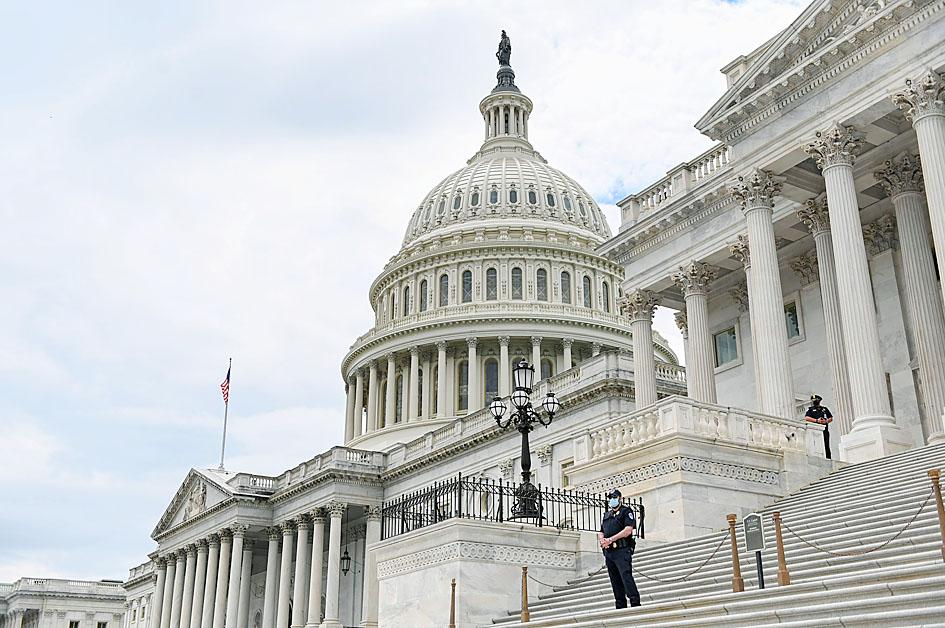The US House of Representatives Armed Services Committee yesterday passed its version of the US annual defense policy bill — the National Defense Authorization Act for fiscal year 2023 — which includes provisions for enhancing military ties with Taiwan.
The committee passed the draft bill in a 57-to-one vote early in the morning, following 16 hours of debate.
A draft of the bill released by US Representative Adam Smith on Monday said it would reiterate that the Taiwan Relations Act and the “six assurances” form the cornerstone of Taiwan-US relations.

Photo: Reuters
Beijing’s rising hostility toward Taipei contravenes the principle that the future of Taiwan must be resolved peacefully, it said.
Washington must maintain capabilities to “resist any resort to force or other forms of coercion that would jeopardize the security, or the social or economic system, of the people of Taiwan,” a resolution attached to the bill said.
The US should continue a policy to “make available to Taiwan such defense articles and defense services in such quantities as may be necessary to enable Taiwan to maintain a sufficient self-defense capability,” it said.
The bill also called for exchanges among defense officials from the two countries, joint military training and exercises, and timely evaluations of Taiwan’s defense and acquisition strategy.
Separately, the lawmakers also supported the US Department of Defense using war games to clarify the strategy of the Indo-Pacific Command, and asked that the US secretary of defense brief the committee on the simulations and their implications before March 15 next year.
Additionally, the defense secretary was asked to brief the committee before March 1 on the state of Taiwan’s air defenses, including its capabilities, interoperability and plans for hastening its development, they said.

Taiwan’s exports soared to an all-time high of US$61.8 billion last month, surging 49.7 percent from a year earlier, as the global frenzy for artificial intelligence (AI) applications and new consumer electronics powered shipments of high-tech goods, the Ministry of Finance said yesterday. It was the first time exports had exceeded the US$60 billion mark, fueled by the global boom in AI development that has significantly boosted Taiwanese companies across the international supply chain, Department of Statistics Director-General Beatrice Tsai (蔡美娜) told a media briefing. “There is a consensus among major AI players that the upcycle is still in its early stage,”

The Central Weather Administration (CWA) yesterday said it expected to issue a sea warning for Typhoon Fung-Wong tomorrow, which it said would possibly make landfall near central Taiwan. As of 2am yesterday, Fung-Wong was about 1,760km southeast of Oluanpi (鵝鑾鼻), Taiwan’s southernmost point, moving west-northwest at 26kph. It is forecast to reach Luzon in the northern Philippines by tomorrow, the CWA said. After entering the South China Sea, Typhoon Fung-Wong is likely to turn northward toward Taiwan, CWA forecaster Chang Chun-yao (張峻堯) said, adding that it would likely make landfall near central Taiwan. The CWA expects to issue a land

‘SECRETS’: While saying China would not attack during his presidency, Donald Trump declined to say how Washington would respond if Beijing were to take military action US President Donald Trump said that China would not take military action against Taiwan while he is president, as the Chinese leaders “know the consequences.” Trump made the statement during an interview on CBS’ 60 Minutes program that aired on Sunday, a few days after his meeting with Chinese President Xi Jinping (習近平) in South Korea. “He [Xi] has openly said, and his people have openly said at meetings, ‘we would never do anything while President Trump is president,’ because they know the consequences,” Trump said in the interview. However, he repeatedly declined to say exactly how Washington would respond in

Japanese Prime Minister Sanae Takaichi said yesterday that China using armed force against Taiwan could constitute a "survival-threatening situation" for Japan, allowing the country to mobilize the Japanese armed forces under its security laws. Takaichi made the remarks during a parliamentary session yesterday while responding to a question about whether a "Taiwan contingency" involving a Chinese naval blockade would qualify as a "survival-threatening situation" for Japan, according to a report by Japan’s Asahi Shimbun. "If warships are used and other armed actions are involved, I believe this could constitute a survival- threatening